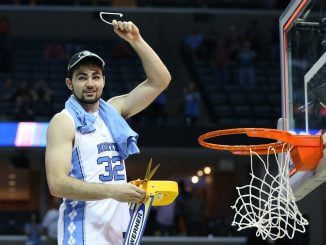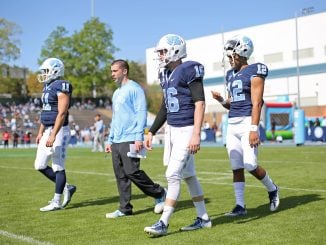
CHAPEL HILL — For the first time since he was hired as North Carolina’s football coach on Dec. 8, 2011, Larry Fedora woke up Saturday morning without the cloud of NCAA sanctions or uncertainty hanging over his program.
Not that he really noticed.
While news that the NCAA had ended its investigation into the Tar Heels’ athletic department without imposing any penalties was greeted with relief, elation and even vindication by some at UNC, Fedora said he’d become “numb” to the situation after six years of disruption.
“I’ve been numb to the whole thing for probably a couple of years because it was out of my hands, nothing I could do,” Fedora said Saturday after his team’s 20-14 loss to Virginia at Kenan Stadium. “I wasn’t going to let that be the reason why we weren’t successful in the first place when I got here.
“I’ve never used it as an excuse and never will. I said we were going to overcome it no matter what happened and whatever they dealt us, we would have overcome it.”
Fedora’s program was hit with penalties shortly after his arrival for transgressions committed during the tenure of his predecessor Butch Davis.
The Tar Heels received a one-year postseason ban that cost them a trip to the 2012 ACC Championship Game, three years of probation and a reduction of 15 scholarships.
Although they avoided further punishment from the NCAA in this second round of investigations, which centered around irregularities in UNC’s African and Afro-American Studies department, Fedora said his program was still adversely affected.
“You’re happy that it’s over,” the coach said of the seemingly neverending case. “But don’t think that we haven’t been penalized. Since I’ve been here we’ve been penalized. Six years.”
The most noticeable impact of the ongoing NCAA probe has come in the area of recruiting, where opposing coaches have used the uncertainty surrounding UNC’s situation as a tool to convince players not to sign with the Tar Heels.
Fedora and his staff countered by telling recruits that they were confident NCAA wouldn’t impose any further sanctions on the football program, even though they had no idea how the investigation would ultimately turn out.
It was a leap of faith that paid off Friday with the NCAA’s determination that it could not conclude UNC had violated its academic rules because the suspect classes were open to the entire student body, not just athletes.
“When I was being recruited, they reassured me that they had done nothing wrong and it was proven true (Friday),” said freshman running back Michael Carter, a three-star prospect from Florida who rushed for a career-high 157 yards against UVA. “I trust our coaching staff, no matter what anyone says. I’ve seen some crazy stuff, but at the end of the day I trust our guys.”
Considering that this year’s injury-riddled Tar Heels team is 1-6 after Saturday’s loss, Fedora acknowledged that the NCAA’s ruling and the end of its involvement with UNC was a badly needed bit of good news.
“Obviously it’s a good thing that we were found innocent of any charges,” Fedora said. “We don’t have to worry about it anymore. We don’t have to defend ourselves anymore in recruiting. We can just sell and we’ve got a lot to sell.”



